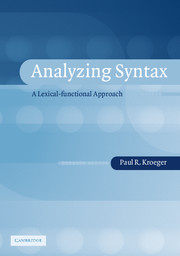Book contents
- Frontmatter
- Contents
- Preface and acknowledgments
- List of abbreviations
- 1 Three aspects of syntactic structure
- 2 Identifying constituents and categories
- 3 Passives, applicatives, and “Dative Shift”
- 4 Reflexives
- 5 Control
- 6 Pragmatic functions: topic and focus
- 7 Filler–gap dependencies and relativization
- 8 Causative constructions
- 9 Serial verbs and related issues
- 10 “Quirky case” and subjecthood
- 11 Syntactic ergativity
- References
- General index
- Language index
8 - Causative constructions
Published online by Cambridge University Press: 05 June 2012
- Frontmatter
- Contents
- Preface and acknowledgments
- List of abbreviations
- 1 Three aspects of syntactic structure
- 2 Identifying constituents and categories
- 3 Passives, applicatives, and “Dative Shift”
- 4 Reflexives
- 5 Control
- 6 Pragmatic functions: topic and focus
- 7 Filler–gap dependencies and relativization
- 8 Causative constructions
- 9 Serial verbs and related issues
- 10 “Quirky case” and subjecthood
- 11 Syntactic ergativity
- References
- General index
- Language index
Summary
Consider the following three sentences:
(1) a My cat died.
b The Mayor caused my cat to die.
c The Mayor killed my cat.
Sentence (1a) is a simple clause which describes an event involving one argument, namely my cat. Sentence (1b) is a biclausal construction involving two participants, and describing two distinct events. The complement clause in (1b) describes the same event that was expressed in (1a), while the matrix clause refers to a different event in which the Mayor performed some unspecified action. Clearly there is a logical connection between the two events: one is the result of the other. In other words, the first event (the Mayor's action) is seen as the cause of the second (my cat dying).
Sentences (1b) and (1c) are similar in meaning, but not perfectly synonymous. Sentence (1c) seems to imply that the Mayor personally killed my cat, while (1b) would be more appropriate if the cat's death was an indirect result of some action on the Mayor's part (e.g., ordering that all the dogs in the dog pound should be released). Nevertheless, there is a substantial overlap in meaning between the two sentences. Both imply a cause-and-effect relationship between two events; the causing event in both cases is something the Mayor did; and the effect (or result) in both cases is the event described in (1a).
Information
- Type
- Chapter
- Information
- Analyzing SyntaxA Lexical-Functional Approach, pp. 192 - 221Publisher: Cambridge University PressPrint publication year: 2004
